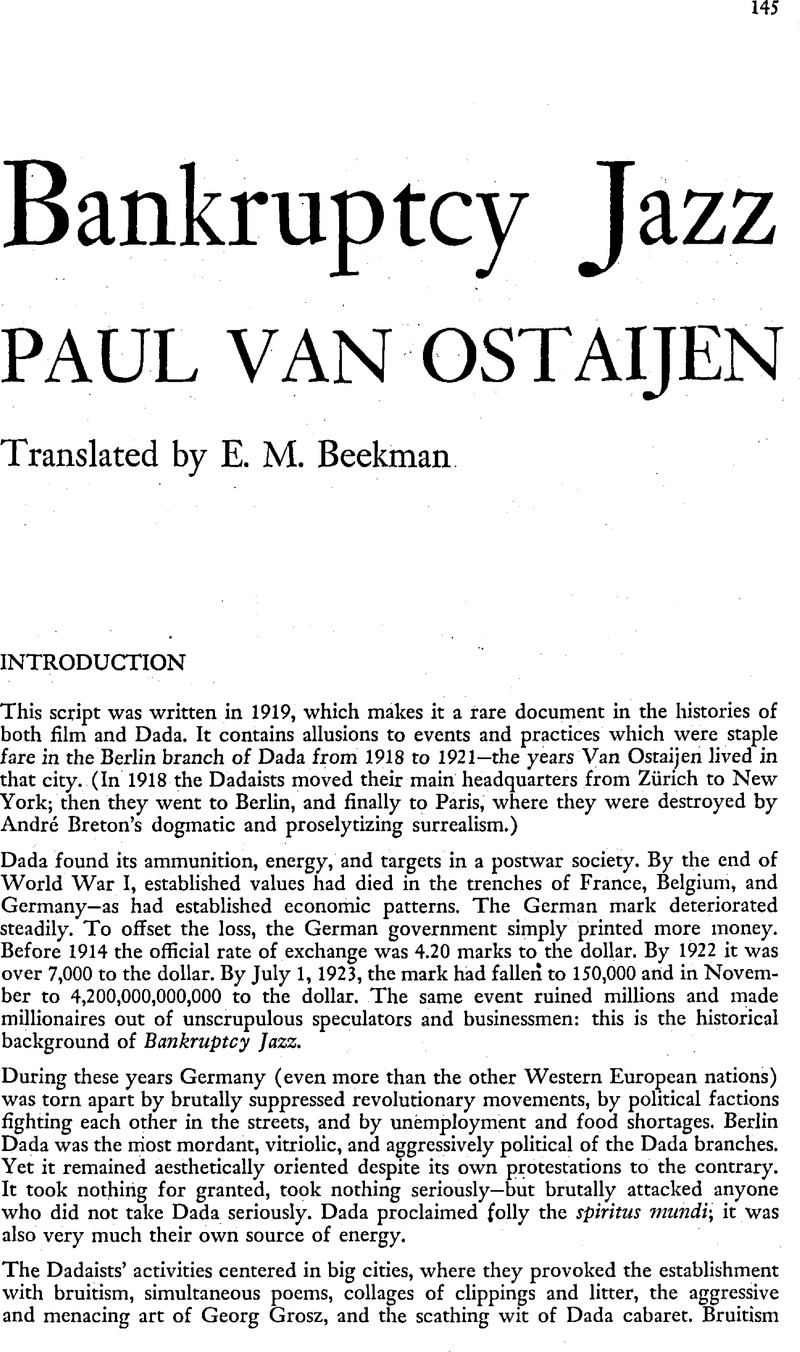No CrossRef data available.
Article contents
Bankruptcy Jazz: Paul Van Ostaijen
Published online by Cambridge University Press: 07 December 2021
Abstract

- Type
- Other
- Information
- Copyright
- Copyright © 1970 The Drama Review
Footnotes
The author chooses the Belgian ministry since it is for him the most readily available. If it is more profitable, from a scenic point of view, to select another ministry as being representative, then there is nothing to be said against this mutation. To Control the scenic appropriateness of this choice belongs in the domain of the direction.—P.V.O.
Translation copyright © 1970 by E. M. Beekman; original in Paul Van Ostaijen, Verzameld Werk, ed. G. Borgers, vol. 3. Antwerp—Hague—Amsterdam: 1966. Printed by permission.
References
Translator's Notes
1 When you think the moon goes down though it won't go down for a while it only seems that way.
2 A cathedral which dominates the skyline of Brussels' upper town, Next to the church is the national bank. The lower city of Brussels is dominated by the Grand Place, famous for its Town Hall, and is the center of business activity and trade. This opposition between various sections of a city is also noticeable in the description of Berlin.
3 A women's magazine.
4 Pun. In the original bergère, meaning both a large, stuffed easy chair, and a shepherdess or nymph.
5 A dance.
6 A bourgeois district of Berlin where the state penitentiary and courts are located. A seedy quarter.
7 Perhaps the French poet Max Jacob (1876-1944), whose work Van Ostaijen admired.
8 Do you know Dada?
9 In the original pofeties, which is either an error for profeties (i.e., “prophetic”) or a pun on pof. If the latter, it has the force of a “slap,” a “shove,” “smash” (a fist); or, in the expression op de pof kopen, to buy on credit, and, in soldiers’ slang, to go AWOL. Certainly the latter meanings are appropriate in the context of a bankrupt Europe.
10 A wealthy cigarette manufacturer who bought works of art for his collection at low prices during the depression.
11 This spelling of the name provides a good pun in Dutch, in which language Niets means “nothing.”
12 Bankruptcy is the literal translation of Pleite, but in the original it also refers to a satirical biweekly periodical sponsored by the Berlin Dadas, 1919 to 1924.
13 In the original Barbarrosados; combination of Barbarossa and dos (the Dutch word for elaborate costume). Emperor Frederick Barbarossa (1120-1190) reunited Germany after the disastrous squabbles of Charlemagne's heirs. According to legend, he has been lying asleep for some eight hundred years in a cave in the Kyffhäuser mountains in Thuringen. When the ravens who nest around the cave depart, the old hero will rouse himself and save Germany from her enemies. This is the conservative, chauvinistic phoenix myth of a Germany rising from its ashes.
14 A five-act romantic opera by Jacques François Halévy (1799-1862).
15 Alfred von Tirpitz (1849-1930). For twenty-nine years, Tirpitz was Secretary of State for the Navy. He retired in 1916, involved himself with nationalistic and rightist politics, and became something of a Teutonic Barry Goldwater.
16 Berlin's Park Avenue.
17 In the original vernegeren. Pun on the verb negeren which means to pester, to bug someone. The Dutch noun neger means Negro.
18 Gustav Noske (1868-1946). German politician, important member of the Social Democratic Party, which took over when the Kaiser fled to Holland in 1918. The government sent Noske to Kiel that same year to restore order after the November Revolution. As supreme commander of troops loyal to the government, he brutally suppressed the abortive revolution of the Communists in Berlin during January of 1919. He performed an effective, ruthless, bloody job, and was probably one of the most hated figures in Germany at that time.
19 At that time similar to our present-day State Police.
20 Stands for Sicherheitspolizei, a much feared arm of the government, with the same function as our FBI.
21 It's so wonderful in the arms of a Noske guardsman.
22 Now the time for playing gin rummy is past.
23 Part of Berlin, a combination of Wall Street and Times Square.
24 Center for political demonstrations in Berlin at that time.
25 One of the main boulevards in Berlin, noted for its cafès, restaurants, and night life.
26 Typical bourgeois district in Berlin.
27 The working-class quarter of Berlin during Van Ostaijen's time.
28 Once one of the longest, broadest, and most imposing boulevards in Europe. Now the Wall cuts it in half at the Brandenburg Gate.
29 I assume that Van Ostaijen is referring to the Charlottenburg Palace, which has a weather vane modeled after the goddess of Fortune.
30 A museum which was a national shrine where weapons and historical souvenirs from Germany's past were on grandiose display. Note that the three battles Van Ostaijen mentions (Ulm, Austerlitz, and Jena) were all lost by the German forces during the Napoleonic wars.
31 A beautiful section of Berlin, including, however, the Spandau Citadel, which was a state prison and treasury of the Kaisers.
32 The most famous bell of the Belfry of Ghent. Charles V had it confiscated after it was used to call the people of Ghent together in revolt against him. Important in this context as a special Flemish symbol, and as a symbol of revolution and liberation.
33 Metonymy for Montmartre. Here mentioned not only for its artists, but also because it has been a center of revolt during Parisian uprisings and times of war.
34 A mass-circulation newspaper.
35 Three enormous Belgian steel corporations which were very powerful economic forces.
36 In the original engelmaaksters. Literally, “those who make angles,” referring to either abortionists (of the butcher variety) or women who, for large sums of money, took in babies (usually illegitimate), promising to take care of them, The babies died very rapidly, allowing the women to repeat the process and make more money.
37 Léon Bourgeois (1851-1925). A French politician and, briefly, in 1896, Prime Minister. He attempted to introduce financial reforms (including an income tax) and was replaced largely because of these measures. After the war he became an ardent internationalist and humanitarian and received the Nobel Peace Prize in 1925.
38 Romain Rolland (1868-1944). Novelist, essayist, and music critic, most famous for his novel Jean Christophe. Another ardent internationalist, he pamphleteered and fought for Franco-German peace and friendship.
39 Georges Duhamel, born in 1884, is particularly important in this context as a positivistic writer and a member of the Unanimists, a society of writers who believed in placing the group before the individual. They held that one's essence should be submerged in a collective such as a factory, city, church, army, etc. The founder of the movement and its most forceful member was Jules Romain.
40 The work of this Flemish poet, born in 1898, was particularly repulsive to Van Ostaijen. Moens maintained an undaunted faith in humanity despite the horrors of World War I. A militant Catholic, Moens saw the poet as a political and social influence on the masses, and his verse was replete with bright humanitarianism.
41 This minor Dutch author (1880-1930) possessed the same blind, optimistic humanitarianism as Moens, without Moens’ force.
42 A nickname for Walter Hasenclever (1890-1940), a German expressionist.
43 When you think the moon goes down.
44 Caillaux (1863-1944) was a politician and Prime Minister of France. He initiated an incometax bill similar to the one Bourgeois had tried to obtain (see footnote 37), which he managed to put through in 1909 after two years of struggle. He lost office in 1912 after infuriating nationalists by trying to effect an international settlement for a crisis which almost exploded into war.


